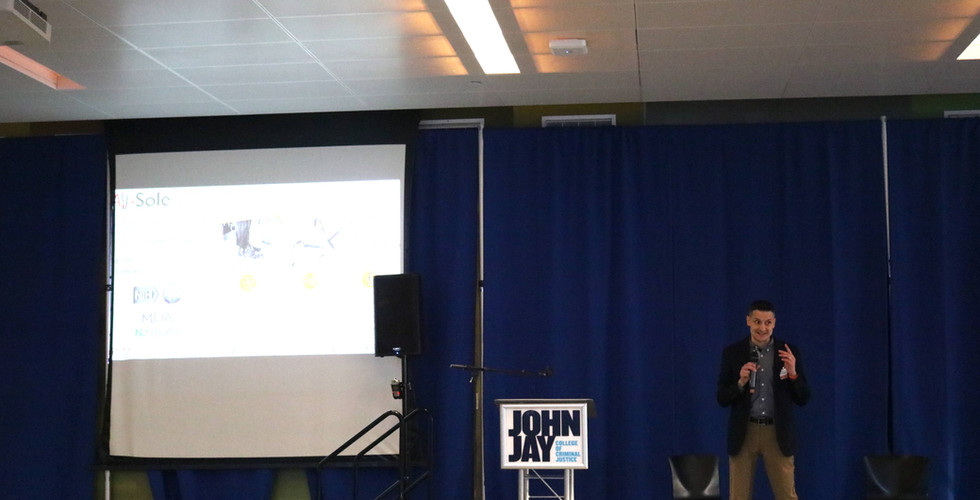2025 NYC Innovation Hot Spot Network Meeting Connects Founders, Shares Insights
- NYC RIN
- Apr 22
- 3 min read
The fifth annual NYC Innovation Hot Spot Network Resource meeting, held on April 9th, was perhaps the most dynamic yet. With more than 100 attendees—primarily comprising early-stage startup founders and leadership, along with resource operators and investors—the evening provided an exciting opportunity to learn about resources in the NY entrepreneurial ecosystem, hear about the personal journey of a local entrepreneur, and enjoy presentations from startups.

John Blaho, CUNY director for Industrial-and Applied Research, opened the meeting, introducing the NYC Innovation Hot Spot and sharing an update on CUNY-supported programs in this more competitive environment, including the new NYS FAST (Federal and State Tech Partnership) center branded as Empire Corps, and the upcoming Roadmap for Business Success Workshops to be held in Hudson Valley and in NYC.
Next came a panel discussion of “Insights for NYC Startups in 2025,” featuring Audrey Chisolm, assistant director, NY Ventures, NY State’s Venture Capital arm; Edwina Yeo, co-founder and CEO, Supermomos, a community tech platform connecting professional communities in tech, business, and finance; and Selin Altinok, investment analyst from the NY office of venture capital startup developer IndieBio. With probing questions from the moderator, Ariella Trotsenko, director, NYC Innovation Hot Spot, the ecosystem leaders shared their perspective on the current outlook and opportunities for founders today.
The three concurred that in today’s challenging climate, it’s important for entrepreneurs to show both hustle and patience, adjusting and adapting to current events and market conditions. Altinek added, “If you can thrive and make it to the other side of this environment, that also reveals the passion of the founder for what they are doing.”
They also talked about the expectation for entrepreneurs to demonstrate substantive proof of product market fit. When asked by Trotsenko how founders can make the most of a “no,” Altinok said, “Ask them what they need to see for you to do better. Relentlessly follow up—with emails, your newsletter…for those who make that effort, I try to give feedback.”
In response to Trotsenko’s question about funding options, Altinek said, “What VC doesn’t love when companies have non-dilutive funding? We love it when our companies have or are securing non-dilutive grants.”
“The best time to raise money is when you don’t need it as much,” added Edwina. “Otherwise, you can come across as desperate. The ideal is if you can raise money from your customers and be ‘Ramen profitable,’—just survivable. That’s the best starting point.”
Next, Arber Ruci, New York NSF I-Corps Hub CEO-in-Residence, led an engaging fireside chat with Mehdi Namazi, founder and chief science officer of Qunnect, which is developing technologies that support scalable quantum computer networking. Alongside numerous amusing anecdotes about his childhood and academic journey, Namazi shared some compelling insights about entrepreneurship.
When asked about rejection—an experience familiar to every entrepreneur, Namazi said, “Rejection used to hurt—that was 300 rejections ago. Now it’s much better. Getting rejected pushes us to do more. Rejection is the bread and butter of entrepreneurship.”
Namazi also shared his perspective on measuring success. “I think there’s nothing more successful than our being a team of 22 people and we’ve never had someone leave. Everyone from the past five years has stayed—even when things looked dicey. To me, that is success—to have a team that is so dedicated and committed.”
“Successful people remember their role in their own success—but at the end of the day there are a lot of talented, hard-working people out there, and there’s a lot of risk and luck that’s out of anyone’s control,” he added. “The only reason I’m still going is because I got lucky; the correct thing has happened at the right time. Don’t blame yourself if it’s not going well, but also know that if it does go well, it’s not only because of you.”
A highlight of the NYC Innovation Hot Spot meeting was the flash demo presentations by seven startups: iTorso, AI-Sole, CarbonCLAIR, FASS Syringe, IAMBIC, BioWraptor, and Smart Monitoring for ECMO. Each company has participated in numerous NY I-Corps and NYC Innovation Hot Spot programs and events and received up to $3,000 in grants to support prototype development in Fall 2024. The demo showcase provided an opportunity for each to share their progress via a two-minute presentation and a company booth.
















































